- Home
- Nancy Mehl
Rising Darkness Page 2
Rising Darkness Read online
Page 2
“That special on TV. Just like you guessed.”
The guard who’d led Tom into the room glanced in our direction, so I checked my watch. We still had time left. Hopefully, he wasn’t going to pull the plug early.
“If Chase is alive, why do you think you know where he is?”
“Because I heard somethin’ I wasn’t supposed to,” Tom said. “When I met Terry at a local diner to give him his plates, he was on the phone. I heard him talkin’ to someone. At first I didn’t pay no attention, but after seein’ that show, I got to thinkin’ about it. Then I read a story about a kidnapping case. Some Mennie . . .” He flushed. “Sorry. Some Mennonite boy turned out to be a stolen kid. He was being hidden away in a small town in Missouri. The name of the town was the same as the name I heard Terry say on the phone.”
“I’m not Mennonite anymore, Tom. You don’t have to apologize to me.”
He blushed. “I shouldn’t use that word anyway. My dad used it all the time, and now I don’t even realize when I say it.” He stared into my eyes. “I’m sorry, Sophie. For everything. I used you, and it was wrong. I know that now. I’ve had a lot of time to think in here, and I’m not proud of the things I done back then—when I knew you.”
I was shocked to hear him apologize. This wasn’t the same Tom Ford I’d known when I’d lived in Kingdom. But even though he seemed sincere, I wasn’t ready to absolve him.
“Are you sure Terry was talking about a town?” I asked, ignoring his apology.
Tom shook his head. “Not at first. But after I saw the story about the kidnapped kid, I put two and two together.”
“Do you know who he was talking to?”
“No. It was kind of a weird conversation.”
The guard who’d been watching us took a step forward. We certainly hadn’t been talking for thirty minutes. Why did he seem so concerned about our conversation?
“Tom, don’t talk to anyone about Chase,” I said quickly. “Not even the guard you trust, okay? And stop writing letters. In fact, get rid of any notes or letters you have that mention him.”
Tom frowned. “Okay. But my friend won’t say nothin’.”
“What if he accidentally slips? Or someone overhears you talking to him? Please don’t take any chances. Shut this down. I don’t want you to get hurt.” Although I sounded concerned for his safety, in my heart I knew my main goal was to protect my story. I felt guilty, but I quickly dismissed it. Investigative reporters lie all the time. It’s part of the job.
“Okay,” he said softly. “I’ll get rid of everything. And I’ll keep quiet.” He leaned in a little closer. “Anything you can do would help, Sophie. Find Terry Chase and then get me a deal for sending you in the right direction.”
“I’ll do my best. Don’t worry,” I said. “You just be careful. If I find anything helpful, I’ll keep your name out of it. Except with the district attorney who prosecuted you. He’s the one who can get your sentence reduced. Of course, I can’t guarantee anything, Tom. All I can do is try. Do you understand?”
He nodded. “Just do what you said. Don’t tell nobody about me until you can get me outta here. Write down this number. Use it if you want to get a message to me. They listen in on prisoners’ phone calls.”
I took a notepad and a pen from my purse. “All right.”
Tom quickly rattled off some numbers, which I wrote down. Then I put my pen and notebook back in my purse.
I noticed the guard say something to his buddy, who frowned. He began walking toward us. “Tom, where is this place? The place you think Chase might be hiding?”
Tom saw the guard, too, and he blinked quickly, fear shining in his eyes. “It’s called Sanctuary,” he said in a whisper. “Sanctuary, Missouri. It’s a Mennie . . . I mean, a Mennonite town.”
I felt as if my heart had turned to lead and dropped all the way to my toes. “A . . . a Mennonite town?”
He nodded. “You should understand that. Great place to hide, huh?”
If I still believed in God, I’d have found this information funny. God’s way of messing with me. The last thing I ever wanted to do was set foot in a town that reminded me of Kingdom. But my desire for a job as a crime reporter outweighed my revulsion toward my Mennonite background. “Do you know anything else?” I asked quickly. “Anything that could help me find Chase?”
“I don’t think so. But there was a strange thing he said that didn’t make no sense.”
“Can you repeat it? Exactly?”
He nodded, his eyes locked on the guard who was definitely headed our way. “He said, ‘It’s safe. It’s protected by an angel.’” Tom shook his head. “Terry wasn’t religious. I’m sure about that. I never could figure it out.”
“Time’s over.” The guard stood next to our table, glowering at us.
“It hasn’t been thirty minutes,” I said, looking at my watch. “You can’t . . .”
“It’s all right,” Tom said brusquely. “I ain’t got nothin’ to say to you, lady. I told you that. Don’t bother me no more. I mean it.” He looked up at the guard. “Get me outta here.”
The guard motioned for Tom to stand up. Before he led him away, Tom’s eyes met mine. The panic I saw there shook me to my core.
The other guard came over and stood next to my table.
“I’ll walk you out, ma’am,” he said.
His hawklike features were accented by a crew cut that began with a sharp V at the top of his forehead. His dark-brown eyes glared a hole through me.
I got up and walked toward the exit, the guard close on my heels. When we reached the first door, he unlocked it, and we headed toward the last exit. There was no sound in this part of the prison except the tap, tap, tap of my heels and the slight squeak of his shoes. They blended together in an odd and disturbing song. For some reason, the peculiar symphony made beads of sweat break out on my forehead. When we reached the final exit, the guard’s arm shot past me and held the door shut. I turned and found myself staring up into his face. His expression made me take a quick breath.
“I’d advise you not to take your friend too seriously,” he said in a low voice. “It could cause you both some trouble you don’t want.”
With that, he unlocked the door and held it open. I hurried out of the prison, the guard’s words and the final expression on Tom’s face fighting for the right to claim the fear that made my heart beat so hard I wondered if the people who walked past me could hear it.
Chapter
Two
After finishing up a couple projects with looming deadlines and arranging for two weeks away from work, I got in my car and headed to Sanctuary, Missouri. It had been easy to get the time off since no one else wanted to take their vacation in March.
I’d been at the paper for a couple of years. One year as a college intern, then, after being hired, I’d spent another year writing about death and food. My editor had been hinting at moving me away from the obits to a better spot in the Entertainment department. Bigger stories. Covering restaurants, movies, concerts, plays, etc. For a twenty-one-year-old who was still wet behind the ears, it was a real honor, especially since I didn’t officially have my degree yet. And even though the position was one some of my colleagues would probably have killed for, more than anything I wanted to be a crime writer. It had been my goal ever since I’d started school. I couldn’t explain my interest. It was a far cry from my Conservative Mennonite background. Maybe it was the fascination of seeing people act out in anger and passion—something that wasn’t allowed in the community I’d been brought up in. Or maybe it was a desire to see justice. And right now I had a chance to get everything I wanted by covering a story that would leave most Kingdom residents horrified.
As I drove, I went over the details of the robbery in my head. A St. Louis armored car company had been robbed in May of 2008. Supposedly, the robbers overpowered one of the firm’s employees as he arrived for work. The employee was forced to let the masked gunmen inside, where they proceeded to kill h
im and another guard. Because the robbers seemed to know the guards’ routines, and there was an unusual amount of gold and unmarked cash on the premises that day, the police suspected someone on the inside was involved. Most of the suspicion was directed toward a guard named Charles Abbott, the man who’d let the robbers into the building. However, that theory was never proven. Before they died, the guards got off some shots of their own. Both of the robbers were hit by gunfire, but they still got away.
Terrance Chase had been connected to the theft through an anonymous tip not long after the robbery. A couple who’d once rented him a room turned over some notes they’d found behind a dresser in the room he’d vacated. The notes had details of the robbery that only someone directly involved would know.
After researching Chase’s friends and associates, the investigators concluded that Chase’s badly injured accomplice was Richard Osborne, nicknamed Snake. Osborne also disappeared around the time of the theft, and his family had no idea what had happened to him. His sister told the investigators that if Rick were alive, he would have contacted them, thus leading to the belief that he had died of his wounds. It was assumed that Chase had disposed of the body, since Osborne was never found.
Local police and the FBI scoured the country, looking for the elusive robber, but they never caught him. The money disappeared without a trace. After a few years, the case grew cold and was virtually dropped.
Then, two months ago, a cable television station aired a special about the robbery. The station had hired three investigators to work together to solve the cold case of Terrance Chase and the 6.6 million dollars he’d gotten away with. Although it was more a publicity stunt than a true investigation, one of the participants, a retired police detective, interviewed an old friend of Chase’s who swore the robber was dead. The man said he’d heard someone had killed him and taken all the money a couple of years after the theft. The investigators appeared to believe him. The show ended with the assumption that Chase really was deceased. The other two detectives, a retired FBI agent and a private investigator, concurred with the theory. However, I knew they were wrong because Chase’s supposed death occurred before I saw him with Tom.
“But if Chase made a clean break, why go to someone like Tom for car tags?” I said to myself. Tom had said Chase was in the area for a completely different reason. Maybe so. Maybe the car tags were an afterthought. But still, it seemed risky. Of course, Tom and his redneck buddies were probably pretty safe to work with. They weren’t the kind of people who would be knowledgeable about old crimes. And it was easier to hide in rural areas than in large cities. After thinking about it, it began to make more sense than I’d believed at first.
I turned these new insights over in my head for a while. I was only about ten miles away from my turnoff when I realized I needed gas. I saw a sign for an upcoming exit that had a gas station, so I took the turn and found the station, thankful for the opportunity to fill my tank. If Sanctuary was anything like Kingdom, this could be one of my last chances to buy gas for a while.
I turned off my engine and grabbed my purse. As I looked for my wallet and my debit card, I realized I’d accidentally stuck several bill payments in my purse instead of putting them in my box before I’d left. I’d been so preoccupied with getting out of town I’d forgotten to mail them. I decided to take care of them when I got to Sanctuary. As I put them back in my purse, I saw the photograph of Terrance Chase I’d brought with me. I picked it up and looked at it closely. I’d stared at the man’s face so many times it was burned into my mind. Not completely trusting my memory, however, I’d wanted an actual picture I could compare to anyone I thought might be him. I put the photo back in my purse and then got out of the car and quickly filled my tank. Feeling thirsty, I grabbed my purse and went into the small gas station and bought a drink.
Once I was back in my car, I felt both excited and worried about being so close to my destination. I reminded myself that Sanctuary wasn’t completely Mennonite. Research had told me that although the town was founded by Mennonites, now they were in the minority.
“It’s not Kingdom,” I said out loud. “Get yourself together. You can do this.”
I got back on the highway, and before I knew it, I was on the final road leading to Sanctuary. Once again, I felt my tension level rise. Ghosts from my past seemed to taunt me. Was I really the confident reporter I pretended to be? Or the scared little girl who always felt she was on the outside looking in? Could I really pull this off, or would it be a complete disaster? Would the specter of my father fill me with so much trepidation I’d run away from Sanctuary the way I’d fled Kingdom?
Although Sanctuary appeared to be a rather isolated community, searching through old obituaries had led me to the name of a woman from the small town who’d passed away about six months earlier. She’d had two sisters who had died before her and no other living relatives. After concocting a story about my mother being the illegitimate daughter of one of the sisters, I’d contacted the pastor of the Mennonite church in Sanctuary. Although he’d seemed rather reticent at first, I finally convinced him I was who I said I was. Once I’d put him at ease, he’d been kind and accommodating, even offering to help me piece together what I could about my supposed grandmother, Clara Byler. I felt some remorse about using him for my own purposes, but too many years of betrayal and pain had shown me I was the only person I could trust to do what was best for me. And finding Terrance Chase was definitely in my best interest.
It was almost four in the afternoon when I finally pulled into Sanctuary. It was pretty much what I’d expected. A small town with dirt streets, wide sidewalks, full of old buildings and a smattering of houses. Settled by Mennonites in the 1800s and called New Zion, eventually the town welcomed people with different beliefs.
I wondered if Pastor Troyer’s initial reluctance to talk to me had been due to all the unwelcome media attention Sanctuary had received a couple of years ago. Even so, it seemed to be the perfect place to hide for a criminal running from justice.
I drove past several businesses on Main Street, as well as a large gray church with blue and white trim and a huge white cross on a tall spire. I could tell by looking at the building that it wasn’t Mennonite. Too decorative.
As I drove farther into town, I spotted several buggies tied up in front of a hardware store. A conservatively dressed Mennonite couple walked toward one of them. When I saw them, that old feeling of dread came over me, and my father’s face flashed in front of me again.
I tried to calm my jangled nerves as I drove to the other side of town, easily finding the plain white building that housed Sanctuary Mennonite Church. Staring at the building, I felt a tickle of dread wriggle around inside my stomach. I took a deep, cleansing breath and began to repeat the positive affirmations I’d learned from reading a book about creative visualization.
“I am calm and relaxed in every situation. I can control my thoughts. No one can dominate me. I am in charge of my life. I am a winner. I am successful in everything I do.” I repeated the affirmations several times, until I felt myself begin to settle down. These affirmations had helped me immensely. I’d even recorded myself saying them, and I played the CD when driving in my car. Visualization had given me the courage to step out and walk toward the life I wanted and deserved. Sometimes I would sit alone, close my eyes, and see myself as a successful crime reporter with money, respect, and power. Now, I turned on the CD player and let my own words give me the courage to face my past.
As I sat in front of the church, a girl came out. A blue dress peeked out from beneath a black cloak, and a white prayer covering sat atop her head. Unwelcome emotions threatened to overwhelm me. Once again, I whispered the words designed to make me stronger. When I felt ready, I got out of the car and approached the girl.
“Excuse me,” I said. “I’m looking for Pastor Troyer.”
The young girl, blond with rather sturdy features, smiled. “Pastor Troyer is my father. If you will follow me, I will ta
ke you to his office.”
I nodded at her, and she turned back toward the simple, unadorned structure. Once we stepped through the door, my insides knotted again. It looked so similar to the church in Kingdom—before the fire that destroyed it. I suddenly felt faint and grasped a nearby chair, trying to steady myself.
“Are you all right, miss?” the girl said. Her eyebrows knit together with concern.
I smiled to put her at ease. “I’m fine. Sorry. Driving all day wore me out, I guess.”
“Do you need help?”
I shook my head. “No. I’m fine now. Just lead the way.”
She looked as if she didn’t believe me. That was good since I didn’t believe me either. But I did everything I could to control myself as I followed her down a long hall to what I assumed was the pastor’s office.
When we stepped inside, a thin man with the obligatory Conservative Mennonite beard and plain clothing smiled up at us. As he stood, I noticed that his daughter seemed comfortable in his presence. I’d never felt that way with my father. I suddenly wanted to run back to my car. Back to the safety of my positive affirmations and the life I’d built away from Kingdom. Summoning every bit of courage I had, I addressed the Mennonite pastor who represented everything I hated.
“Pastor Troyer?”
“Yes, can I help you?”
I walked toward him and held out my hand. “I’m Emily McClure. I talked to you about my grandmother, Clara Byler?”
“Oh yes, Miss McClure. We’ve been expecting you.” After shaking my hand, he pointed toward one of the chairs sitting in front of his desk. “Please, have a seat.”
“I really appreciate your help in learning more about Clara,” I said as I sat down.
“Excuse me a moment, Miss McClure.” He turned his attention to his daughter. “You can go on to the clinic, Ruth. Thank you for your help.”
“Okay, Papa,” Ruth said. She waved at me. “I am happy to have met you.”
“I’m happy to have met you, too, Ruth.”

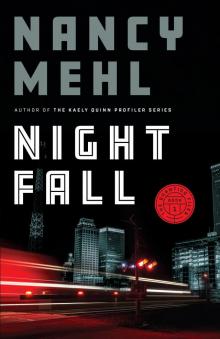 Night Fall
Night Fall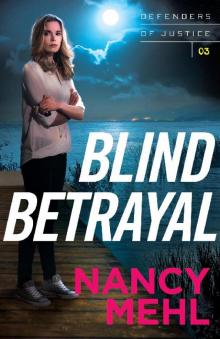 Blind Betrayal
Blind Betrayal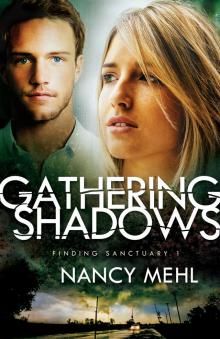 Gathering Shadows
Gathering Shadows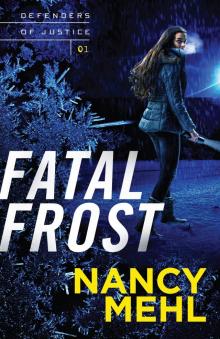 Fatal Frost
Fatal Frost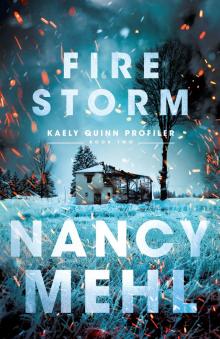 Fire Storm
Fire Storm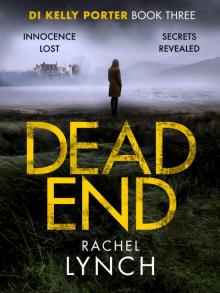 Dead End
Dead End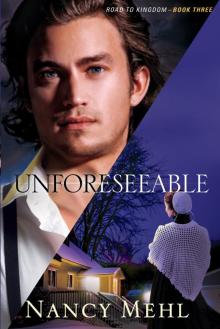 Unforeseeable
Unforeseeable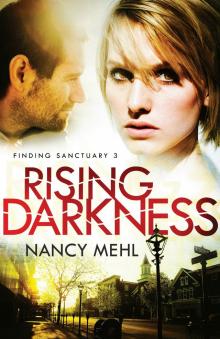 Rising Darkness
Rising Darkness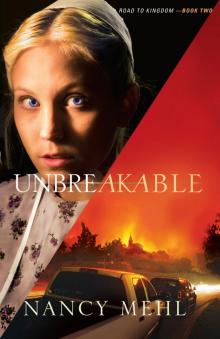 Unbreakable
Unbreakable Simple Secrets (The Harmony Series 1)
Simple Secrets (The Harmony Series 1)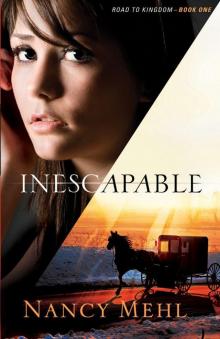 Inescapable
Inescapable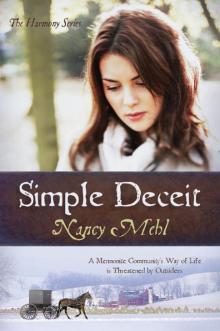 Simple Deceit (The Harmony Series 2)
Simple Deceit (The Harmony Series 2)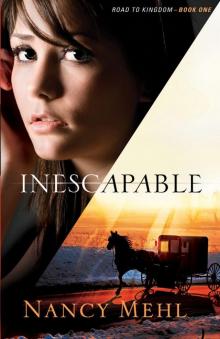 Inescapable (Road to Kingdom Book #1)
Inescapable (Road to Kingdom Book #1) Simple Choices
Simple Choices